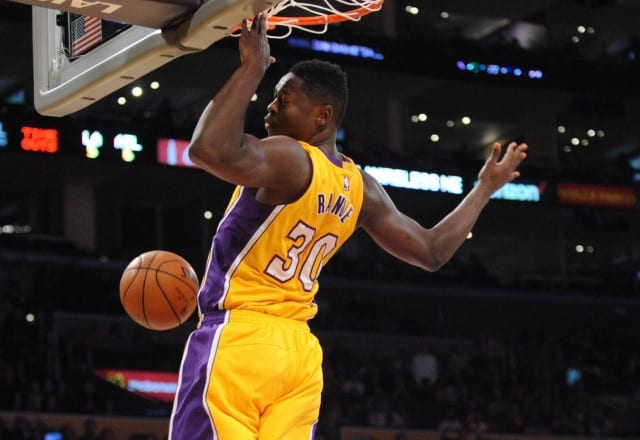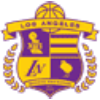Rumor has it that when the Los Angeles Lakers and Sacramento Kings were talking a DeMarcus Cousins deal last June, the Lakers carefully weighed their assets. They were willing to part with their number two pick and possibly Jordan Clarkson, if need be. They were not, however, willing to include Julius Randle.
Months later, during a preseason game in Ontario, California, we saw why.
It was early October, and the Lakers had just returned to Southern California from an intense training camp in Hawaii. The Toronto Raptors had come to town for a tune-up game, and both franchises were hoping to get a little practice running their sets.
It wouldn’t be pretty, but preseason games rarely are.
In the third quarter, Toronto wing DeMar DeRozan whirled his way to the rim, attempting a shot over the outstretched arm of the ill-fated Robert Upshaw. Randle, who had stuck to mid-range shooter Luis Scola at the free throw line, saw his chance.
He dropped into the paint as soon as it was clear DeRozan wasn’t going to kick the ball out, and then out-leapt and out-muscled center Bismack Biyombo for the rebound.
It was a fairly standard play for a power forward, but then things got crazy.
In this situation, most 6’9”, 250-pound players would hand the ball off to a guard and plod down court to set up the offense. Instead, Randle turned and took off, accelerating surprisingly quickly for a player his size.
Toronto’s DeMarre Carroll, a highly sought-after defensive ace who had just been poached from the Atlanta Hawks that summer, smelled blood in the water. A seemingly out-of-control big trying to dribble the down court is easy prey, and he was all too happy to take advantage.
Carroll lunged for the ball, expecting to teach the young Randle a lesson about over-confidence.
He got nothing but air.
In one motion, Randle crossed over from left to right, baiting Carroll in, and then dribbled the ball behind his back when Carroll reached. The celebrated defensive stopper Toronto had coveted had been duped.
At mid-court and still moving at full speed, Randle then fired a pass across his body to the wing, hitting Kobe Bryant in stride for a pull-up three. Bottom. Crowd goes wild.
Just a day before Bryant had called Randle “Lamar Odom in Zach Randolph’s body” — a nod to his impressive combination of physical strength and versatility.
That night in Ontario, it appeared that Bryant’s words would be prophetic, and that the Lakers had found themselves one heck of a player.
Fast forward to today. Five months have passed since the game against the Raptors, and Randle is still turning heads.
He leads the Lakers in rebounding by a large margin with an average of 10.1 per game, good for 11th in the league. Aside from the Timberolves’ Karl-Anthony Towns, every other player ahead of Randle in the rebounding department spends the bulk of their minutes at center. As something of an undersized power forward, Randle uses his strength and savvy to beat larger players to the ball, which is a credit to his aggressive mindset.
Lakers coach Byron Scott recently told Broderick Turner of the Los Angeles Times:
“He’s got a Dennis Rodman mentality. When the ball comes into his area, it’s his.”
Randle has also worked to improve his finishing at the rim, once an area of major concern. Since the All Star break, he is converting at an acceptable 59 percent from within five feet, a marked improvement from the 51 percent he shot earlier in the season.
However, in spite of Randle’s success, the impressive display of skill that he showed on that night in October feels like nothing more than a distant memory. As some areas of his game have improved, others have all but disappeared.
He continues to push the ball in transition from time to time, and still moves with a quickness and ferocity that few can match. While playing against the Cleveland Cavaliers last week, Randle exploded past Kyrie Irving and hammered home a frightening dunk that showcased just how explosive he can be.
Unfortunately, what has become noticeably absent is his passing. These days, when Randle does take off on a fast break, his head is down and intent on getting to the rim at all cost. He frequently misses open teammates, to the point where the Lamar Odom comparisons now seem off-base.
“When he steps on the floor, if you play him 25 minutes or more, it’s a double-double… he’s that good as far as rebounding the ball.” -Byron Scott
While Odom was perhaps over-generous, Randle has gone the opposite direction, becoming a black hole offensively.
In the halfcourt, he tends to look for isolation situations so that he can use his quickness and agility to beat his man one-on-one. That’s a great weapon to have, but earlier in the season, we saw him drawing defenders in and kicking out to open shooters, something that has also become increasingly rare.
In fact, since the All Star break, Randle ranks dead last on the team in percentage of passes that become assists.
In other words, a higher percentage of Nick Young’s passes turn into assists than Julius Randle’s.
Let that sink in for a second.
If someone had suggested that would be the case back in October, they would have been committed to Arkham, yet here we are.
Last Tuesday against the Kings, he routinely missed open teammates, instead attempting to drive the ball to the rim himself. On this play, he ignores both Jordan Clarkson and Larry Nance Jr. in order to attack two defenders:
https://vine.co/v/iwQEPLxEb1J
It’s a marked change from the Randle we saw at the beginning of the season.
Of course, even with the ball sticking in his hands, there is no doubt that overall Randle is playing better basketball than he was earlier in the year. He still needs to work on his outside shot and defense in the off-season, but assuming he does that, he still has a very bright future.
So why harp on his hibernating playmaking skills?
Simply put, the Lakers don’t have the luxury of shortcomings. They have the second-worst record in the league and desperately need to right the ship if they hope to stay in the spotlight post-Kobe.
They need to rebuild around young talent, but Los Angeles still owes two future first round picks as a result of the regrettable Steve Nash and Dwight Howard trades. This limits the amount of opportunities they will have to draft potential stars, making it all the more crucial that the players they do obtain completely fulfill their potential.
For Randle, that means not only rebounding and scoring, but also making his teammates better by setting them up for easy looks. These are all things that he has the ability to do right now, but it appears that as his finishing has improved, his passing has taken a back seat. As a result, a player who once looked extremely versatile has become somewhat limited, focusing almost all of his energy on rebounding and attacking the basket.
Those are excellent areas to target, but there are a lot of power forwards who excel in those areas. On the other hand, there are very, very few who can handle the ball and pass the way that Randle can. It’s those skills that truly set him apart.
Julius Randle is already a very good player, but he’s going to need to bring back some of the playmaking flair that we saw in October if he wants to live up to the lofty expectations the Lakers have for him.





